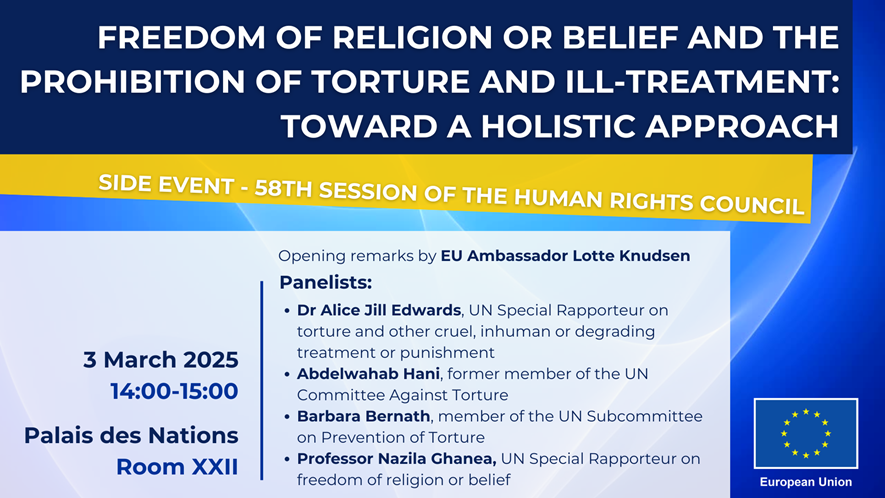HRC58 Side Event - Freedom of Religion or Belief and the Prohibition of Torture and Ill-Treatment: Toward a Holistic Approach

The mandates of the Special Rapporteur on freedom of religion or belief and the Special Rapporteur on torture have, throughout their respective lifespans, acted on countless allegations of torture and other forms of cruel, inhuman, or degrading treatment or punishment which are intertwined with intolerance and discrimination on the basis of religion or belief. These include aggravated acts of ill-treatment toward persons belonging to religions or beliefs, as well as specifically tailored ill-treatment carried out with the religious or belief sensibilities of the victims in mind. While cases such as these speak to a clear and direct overlap between both rights, many other cases also call for exploring the overlap between them, such as the denial of religious diet in detention, the destruction or vandalism of graves, or the systematic socioeconomic marginalization of religion or belief minorities.
Freedom of religion or belief and the prohibition on torture and ill-treatment are both non-derogable rights, the latter being recognised as a peremptory norm of customary international law. Both are embedded in the International Covenant on Civil and Political Rights, while the Convention against Torture specifically prohibits ill-treatment based on discrimination of any kind, which clearly includes on the basis of religion or belief. Yet interaction between both rights has been very limited, largely confined to the questions of torture and ill-treatment carried out in the name of religion or interpretations thereof, and the right to non-refoulement. While these concerns are indeed important, there remain significant gaps and unexplored potential of a deeper understanding of how both rights interrelate and support each other.
On 4 and 5 March 2025, the Special Rapporteur on freedom of religion or belief will present her report on freedom of religion or belief and the prohibition of torture and ill-treatment to the 58th Session of the Human Rights Council.
At this side-event on 3 March 2025, she will be joined by the Special Rapporteur on torture, Dr Alice Jill Edwards, Mr Abdelwahab Hani, former member of the UN Committee Against Torture, and Mrs Barbara Bernath, member of the UN Subcommittee on Prevention of Torture, to explore some of the key questions which arise when considering a dialogue between both rights.
Guideline questions to be explored by the panelists will include:
-
Where do the legal frameworks for the prohibition of torture and ill-treatment and the freedom of religion or belief overlap?
-
To what extent have these overlaps been recognised in mandate practice? How does this compare to the existing international human rights caselaw?
-
What are the benefits to rights-holders which may arise from a deeper understanding of how both rights interact? What more can be done?
